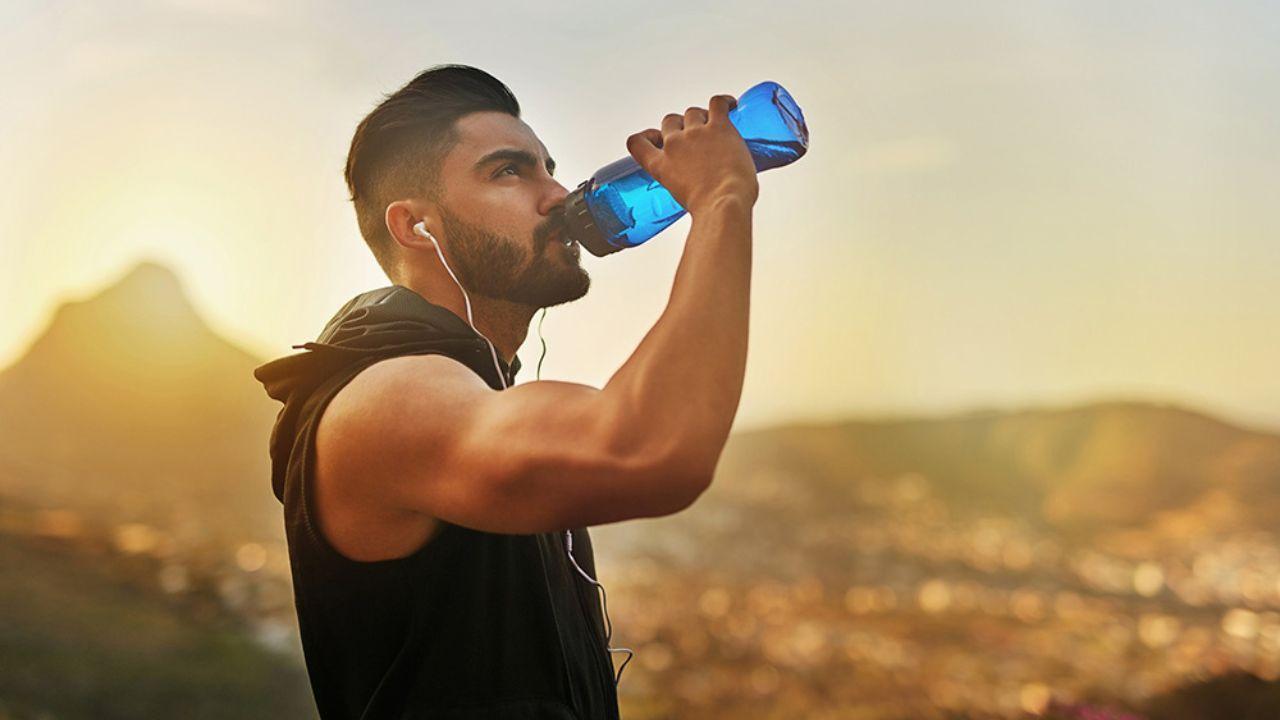
Post by: Zayd Kamal
Staying properly hydrated is absolutely essential for athletes of every age and skill level. Whether you're out on the soccer field, running laps around the track, or hitting the gym, ensuring you have enough fluids in your system can make a huge difference in how well you perform and how good you feel overall. Let's dive into why hydration is so important and how it can help you become a better athlete.
Hydration isn't just about drinking water when you feel thirsty. It's about keeping your body in top shape so it can do its best work for you. When you play sports or exercise, your body sweats to cool itself down. This is great because it helps you not overheat, but it also means you lose water. If you don't replace that lost water, your body can't work as well, and you might feel tired, dizzy, or even get muscle cramps.
Drinking enough water helps your body do lots of important things. It helps your muscles stay loose and flexible, so you can run faster and jump higher. It keeps your joints working smoothly, which is important if you're bending, twisting, or turning a lot during sports. Water also helps carry nutrients to your muscles and takes away waste products that can build up when you exercise.
When you're not hydrated enough, you might notice some signs that your body needs more water. Your mouth might feel dry, your pee might be dark yellow, or you could even feel really thirsty. Sometimes, you might get a headache or feel tired even if you've had enough sleep. These are all signs that your body needs more water to work at its best.
To make sure you're getting enough water, it's a good idea to drink some before you start playing sports, during your breaks, and after you finish. Sports drinks can be helpful too, especially if you're sweating a lot or playing for a long time. They have extra things like electrolytes and sugars that can keep your energy up and help your body stay balanced.
Remember, staying hydrated isn't just about being a better athlete—it's about taking care of your body so you can have more fun and feel your best while you're playing sports. So, next time you're gearing up for a game or heading out for a run, make sure you've got your water bottle handy and take sips regularly. Your body will thank you for it, and you'll be ready to tackle any challenge that comes your way!
This article aims to explain the importance of hydration in a simple and engaging manner suitable for kids and children, emphasizing the benefits of proper hydration for athletic performance without using bullet points.
Hydration is like fuel for your body, especially when you're active or playing sports. Imagine your body is like a car: water is what keeps everything running smoothly. Here’s why staying hydrated is crucial:
Water helps your muscles work better. When you drink enough water, you have more energy to run, jump, and play your favorite sports. It keeps you feeling strong and ready to tackle any activity.
Your body gets hot when you exercise. Water cools you down by making sweat, which evaporates and cools your skin. This helps prevent overheating, so you can keep playing without feeling too hot.
Drinking water keeps your brain sharp. When you're hydrated, you can think faster and concentrate better in school and on the field. It helps you remember plays, solve problems, and stay focused during games.
When you don’t drink enough water, you might feel tired or cranky. Hydration keeps you feeling good and ready to have fun. It stops your muscles from getting sore and helps you recover faster after playing hard.
Water keeps your body healthy inside and out. It helps your kidneys clean your blood and removes waste. Drinking water also keeps your skin looking nice and prevents you from getting sick.
For kids and athletes, drinking water throughout the day is essential. You should drink water before, during, and after playing sports. Listen to your body – if you feel thirsty, that’s your signal to drink up!
You can make drinking water more exciting by adding slices of fruit like oranges or berries. This adds flavor and makes it more fun to drink. Try to avoid sugary drinks because they can make you feel thirsty again quickly.
Dehydration happens when your body loses more water than it takes in. This can occur when you're not drinking enough fluids, especially during hot weather or vigorous exercise. It's essential to recognize the signs of dehydration so you can take action to rehydrate and stay healthy.
Feeling thirsty is one of the first signs that your body needs more water. When you're thirsty, it means your body is already starting to become dehydrated. It's important to drink fluids regularly throughout the day, not just when you feel thirsty.
If your mouth feels dry or sticky, and your lips are dry, these are signs that you may be dehydrated. Saliva helps keep your mouth moist, so when you're dehydrated, your mouth can feel parched.
The color of your urine can indicate your hydration status. Dark yellow or amber-colored urine is a sign of dehydration. When you're well-hydrated, your urine should be pale yellow or almost colorless.
Dehydration can make you feel tired, weak, or dizzy, especially after physical activity. When your body lacks enough water, it can affect your energy levels and make it harder to concentrate.
A dehydration headache is a common symptom. When you're dehydrated, your brain temporarily contracts or shrinks from fluid loss, leading to headaches or migraines.
If you're not urinating regularly or your urine output is significantly reduced, it could be a sign of dehydration. Your body conserves water when it's dehydrated, leading to less frequent urination.
Dehydration can affect your skin, making it feel dry, tight, or flaky. Lack of moisture in the skin can also make it less elastic and more prone to irritation or itching.
Dehydration can cause muscle cramps or spasms, especially during exercise or physical activity. Electrolyte imbalance due to fluid loss can lead to muscle cramping.
When you're dehydrated, it can affect your mood and cognitive function. You may feel irritable, anxious, or have difficulty concentrating.
In severe cases of dehydration, your heart may need to work harder to pump blood to your organs, leading to an increased heart rate.
Proper hydration is key to performing your best in sports. Here are some effective strategies to keep you hydrated and energized throughout your activities:
Hydration begins long before you hit the field or court. Start your day by drinking water regularly. It’s the best way to prepare your body for physical activity. Aim for at least 8 glasses of water a day to stay hydrated.
Water is the ideal choice for hydration, but during intense exercise or prolonged activity, consider sports drinks that replenish electrolytes like potassium and sodium. These help maintain your body’s fluid balance and prevent dehydration.
Before you start exercising, drink about 16 ounces of water or a sports drink a few hours beforehand. This ensures your body starts off well-hydrated and ready to perform. Avoid caffeinated drinks, as they can lead to dehydration.
During your workout or game, sip on fluids every 15-20 minutes. This helps replace the fluids lost through sweat and keeps your body cool. Sports drinks with carbohydrates and electrolytes can be beneficial for sustained energy during longer activities.
After you’ve finished exercising, it’s crucial to replenish lost fluids. Drink water or a sports drink to replace electrolytes and carbohydrates. Rehydrating properly helps your muscles recover and prepares you for the next session.
Pay attention to signs of dehydration, such as thirst, dry mouth, fatigue, or dark urine. These are indicators that your body needs more fluids. Respond promptly to these signals by drinking water to avoid performance decline and potential health risks.
For young athletes, teaching proper hydration habits is essential. Encourage them to drink water before, during, and after physical activity. Limit sugary drinks and emphasize the importance of listening to their bodies to stay hydrated.
Before you lace up your sneakers and hit the field or gym, it’s essential to prepare your body by hydrating properly. Pre-exercise hydration is like giving your body the fuel it needs to perform at its best. Here’s why it’s crucial and how to do it right.
Hydrating before exercise helps your body function smoothly. When you drink enough water or a sports drink before you start sweating, you give your muscles the moisture they need to stay strong and flexible. It also helps regulate your body temperature and keeps your joints moving smoothly.
The amount of fluid you need before exercise depends on factors like how long you’ll be active and how much you usually sweat. As a general rule, aim to drink about 16 ounces of water or a sports drink a few hours before you start exercising. This gives your body time to absorb the fluids and get ready for action.
Water is usually the best choice for hydrating before exercise because it’s pure and refreshing. If you’re exercising for more than an hour or in hot weather, consider a sports drink that contains electrolytes like sodium and potassium. These minerals help replenish what your body loses through sweat and keep your energy levels up.
Skipping pre-exercise hydration can leave you feeling sluggish and less able to perform your best. Signs of dehydration include feeling thirsty, having a dry mouth, and noticing dark yellow urine. By drinking fluids before you exercise, you can prevent these symptoms and keep your body in top shape.
If you’re a young athlete, it’s especially important to hydrate before exercise. Make it a habit to drink water or a sports drink before practices and games. Encourage your teammates to do the same so everyone can play their best and stay healthy.
When you're exercising, especially during intense activities like running or playing sports, keeping your body hydrated is crucial. Here's how to ensure you stay energized and perform at your best during exercise.
During exercise, your body sweats to cool down, but this also means you're losing fluids and electrolytes. Hydration helps maintain your body's balance, keeping your muscles working efficiently and preventing cramping or fatigue.
Water is excellent for most workouts, but if you're exercising intensely or for longer periods, consider sports drinks that provide electrolytes and carbohydrates. These drinks help replace what you lose through sweat and can boost your energy levels.
During exercise, aim to drink small amounts of fluid regularly, about every 15-20 minutes. This helps prevent dehydration and keeps you hydrated throughout your workout. Listen to your body's thirst cues and drink accordingly.
While it's important to stay hydrated, overhydration can also be a concern. Drinking too much water without replacing electrolytes can lead to hyponatremia, a condition where your blood sodium levels become dangerously low. Stick to a moderate hydration plan that suits your activity level.
For shorter, less intense workouts, water is usually sufficient. For longer, more intense sessions, sports drinks can provide the extra hydration and fuel your muscles need to keep going strong.
After exercising, it's crucial to replenish the fluids and nutrients your body lost during the workout. This process, known as post-exercise hydration, helps you recover faster and maintain optimal performance for your next session.
When you exercise, especially if it's intense or in hot weather, your body loses water through sweat. Rehydrating after exercise helps restore this lost fluid, preventing dehydration. Dehydration can lead to fatigue, muscle cramps, and even more severe health issues, so it's essential to replace fluids promptly.
Water is the best choice for rehydrating after exercise. It's refreshing and effectively replaces lost fluids without adding extra calories or sugar. If your workout was particularly intense or lasted longer than an hour, sports drinks can be beneficial. These drinks contain electrolytes like sodium and potassium, which help replenish minerals lost through sweat.
The amount of fluid you need to drink after exercise depends on several factors, including the intensity and duration of your workout, as well as your body size and sweat rate. As a general guideline, aim to drink enough fluid to replace what you lost through sweat. A good indicator is to drink until you no longer feel thirsty and your urine is pale yellow in color.
Ideally, start rehydrating as soon as you finish your workout. Your body is most receptive to replenishing fluids and nutrients immediately after exercise. Keep a water bottle handy and take small sips frequently until you feel adequately hydrated.
As a young athlete, staying hydrated is crucial for your health and performance. Whether you're playing soccer, swimming, or practicing gymnastics, your body needs water to function at its best. Here are some essential tips to help you stay hydrated and perform your best in sports.
Hydration is vital because water helps your body in many ways. It keeps your muscles working properly, helps you stay cool when you're active, and ensures that nutrients are delivered to your cells. When you're hydrated, you feel more energized and focused, which is important for doing well in sports.
It's essential to recognize when your body needs more water. Signs of dehydration include feeling thirsty, having a dry mouth, dark yellow urine, feeling tired or dizzy, and having a headache. If you notice these signs, it's essential to drink water right away to rehydrate your body.
Before you start playing sports, make sure to drink water or a sports drink. It's best to drink about 16 ounces of fluid a few hours before you begin. This helps your body start hydrated and ready to perform well. Avoid drinks with caffeine or lots of sugar, as they can make you more dehydrated.
During your sports activities, drink small amounts of water or sports drinks regularly. Take a sip every 15-20 minutes, especially if you're playing in hot weather or doing intense exercises. Sports drinks can be helpful because they replace electrolytes, which are minerals that your body loses when you sweat.
After you finish playing, continue to drink water to rehydrate your body. You might feel thirsty after exercising, so listen to your body and drink enough to satisfy your thirst. Water is the best choice for rehydration, but if you've been exercising for a long time or sweating a lot, a sports drink can help replace electrolytes.
To maintain good hydration habits, carry a water bottle with you throughout the day. Drink water with meals and snacks, and choose water instead of sugary drinks like soda or fruit juices. Encourage your friends and teammates to stay hydrated too, because being hydrated helps everyone perform better in sports.
Staying hydrated is crucial for young athletes to perform at their best. Whether playing soccer or swimming, water keeps muscles working, prevents overheating, and delivers nutrients. Signs of dehydration include thirst, dry mouth, and dark urine. Before sports, drink water to prepare; during, sip fluids regularly to replace electrolytes lost through sweat. Afterward, continue hydrating to recover. Encouraging healthy habits like carrying a water bottle and avoiding sugary drinks helps maintain peak performance.
DXB News Network reminds young athletes and their families of the importance of staying informed about hydration for optimal sports performance. Always consult with healthcare professionals for personalized advice on hydration and nutrition tailored to individual needs.
A1: It's recommended for young athletes to drink about 16 ounces of water or a sports drink a few hours before starting sports. This ensures they begin hydrated and ready to perform their best.
A2: Sports drinks can be beneficial during prolonged or intense activities as they help replace electrolytes lost through sweat. For shorter activities, water is usually sufficient.
A3: Signs include feeling thirsty, having a dry mouth, dark yellow urine, feeling tired or dizzy, and experiencing headaches. Recognizing these signs early helps in prompt rehydration.
A4: Adding slices of fruits like oranges or berries to water can add flavor and make drinking more enjoyable. Avoiding sugary drinks is important to prevent thirstiness.
A5: Hydration supports overall health by helping muscles function properly, maintaining body temperature, delivering nutrients to cells, and promoting focus and energy throughout the day.
#trending #latest #HydrationTips #YoungAthletes #SportsPerformance #StayHydrated #HealthyLiving #AthleteLife #HydrationStrategies #SportsHealth #WaterIsLife #StayStrong #breakingnews #worldnews #headlines #topstories #globalUpdate #dxbnewsnetwork #dxbnews #dxbdnn #dxbnewsnetworkdnn #bestnewschanneldubai #bestnewschannelUAE #bestnewschannelabudhabi #bestnewschannelajman #bestnewschannelofdubai #popularnewschanneldubai

PM Modi will visit Jeddah to meet Crown Prince MBS. Talks will cover strong ties, strategy, and new MoUs. This is his first visit in his third term....Read More.

Sultan Haitham will visit Russia for two days from Monday to strengthen Oman-Russia ties and discuss cooperation and key international and regional issues...Read More.














Humanoid Robots Race with Humans at Half-Marathon in China
21 humanoid robots raced alongside runners in the Yizhuang half-marathon, showcasing robotic enginee

Woman Brain-Dead After Paris Cryotherapy Accident
A woman is brain-dead after a fatal cryotherapy accident in Paris that also claimed a gym worker’s l

A Chinar Leaf in the Desert: Zubair Kirmani and the Journey of Kashmir at World Art Dubai
A Chinar Leaf in the Desert: Zubair Kirmani and the Journey of Kashmir at World Art Dubai

Carla Gía Brings the Language of Duality to World Art Dubai 2025
Carla Gía Brings the Language of Duality to World Art Dubai 2025

Not Just a Painting, It’s a Pulse: Deena Radhi at World Art Dubai 2025
Not Just a Painting, It’s a Pulse: Deena Radhi at World Art Dubai 2025